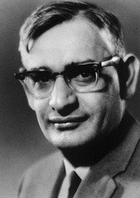 Har
Gobind Khorana (1968 Nobel Laureate in Medicine)
Har
Gobind Khorana (1968 Nobel Laureate in Medicine)
 Har
Gobind Khorana (1968 Nobel Laureate in Medicine)
Har
Gobind Khorana (1968 Nobel Laureate in Medicine)
Personal Info:
-born of Hindu parents in Raipur, a little
village in Punjab, which is now part of west Pakistan
-correct date of birth is unknown but documents
say January 9th, 1922
-youngest of family of 1 daughter and 4 sons
-father was a village agricultural taxation clerk
in the British Indian system of government
- although poor father dedicated to educating
his children and they were practically the onlt literate people in the
village...
-attended high school in India and eventually
attended the Punjab University in Lahore (M. Sc. degree)
For more information click here:
H.
G. Khorana
Experimental research was performed over a period of 15 years which included work at both the University of British Columbia and the Institute for Enzyme Research of Wisconsin... not including post doctoral work and early research in England.
The artical "Polynucleotide Synthesis and the Genetic Code" draws upon a number of dicoveries made during the 1950's and early 1960's from a variety of disciplines.. biology.. genetics... biochem... physics, etc.
Chemical structure of nucleic acids became known in early 1950's. Thought of possible laboratory synthesis in the field, ie. put together nucleosides and nucleotides to form internucleotide linkages of the type normally found in naturally occuring nucleic acids. Problems encountered...
Can chemical synthesis make a contribution to the study of the fundamental process of information flow, DNA...RNA...Protein?
Genetic Code

at time basically
only experimental approach was that of direct correlation of the sequence
of a nucleic acid with that of a protein, coded by this nucleic acid....
Crick et al. deduced the three letter property
of the genetic code by an ingenious application of the frame
shift mutation...
getting directly at the coding problem.....
experimental approach at "cracking" code Matthaei and Nirenberg polyphenylalanine experiment
For more info click here... Genetic Code